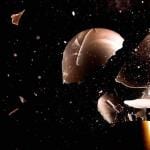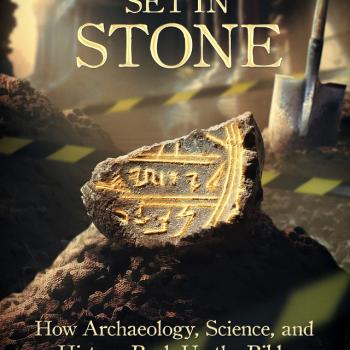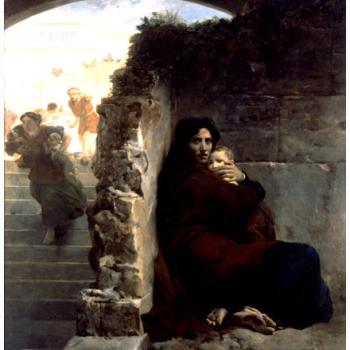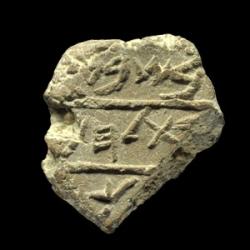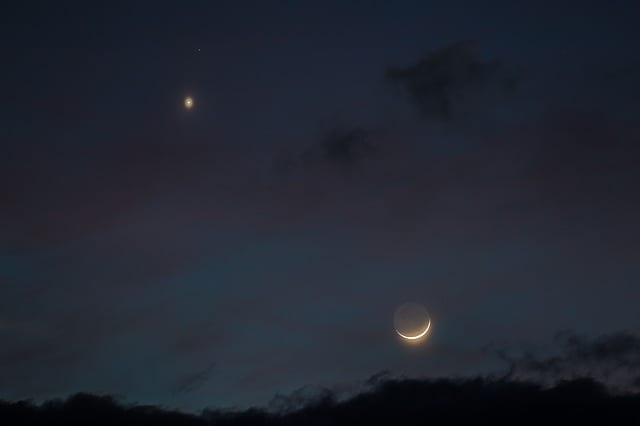
I assert that the star of Bethlehem was (most plausibly) a conjunction when the wise men first saw it, and a bright Jupiter, when they saw it in Jerusalem and over Bethlehem: without ruling out the possibility that it may have been a supernatural manifestation, as I have made clear in my other recent papers on the topic.
I think the natural interpretation can be harmonized with a straightforward reading of Scripture (as well as astronomical data on conjunctions, provisionally accepting for other reasons, Herod’s death in 1 BC): understood as phenomenological language rather than hyper-literal, as atheists — often former fundamentalists themselves — so often casually assume must always or almost always be the case.
I would put it this way: if a natural explanation is sufficient to explain it, we need not automatically posit a miraculous occurrence. Miracles have always been very rare and the exception to the rule in the Bible and in subsequent Christian history. That being the case, I think a natural explanation is more likely and plausible, in light of what I know about the Bible and miracles.
We Christians believe that God in His providence is equally able to arrange things so that this notable astronomical event happened (from our perspective) to line up with the birth of Jesus, just as we believe an eclipse and an earthquake lined up with the crucifixion of Jesus (another analogy to back up what I’m saying). Both were confirming signs, and both quite natural events. Other things (e.g., the virgin birth / incarnation and resurrection) can only be supernatural events.
My approach in my previous paper was to make a case from “internal plausibility.” The idea was to show how the Bible presents plenty of straight astronomy without viewing the stars per se as supernatural. The Bible views them as part of the natural (and observable and patterned) creation of God.
That was the argument I made, with about two-thirds of the paper being the preliminary goal of showing how the Bible viewed astronomy and the natural world. Then I contended that a natural explanation of the star couldn’t be ruled out in light of these facts; and that it was, in fact, more plausible in my opinion, coupled with the fact that the Magi were astronomers as well.
When they saw the star “in the east” they weren’t thinking, it seems to me: “wow, look at that miraculous light in the sky!” They would much more likely have thought, I submit: “this [natural] star has significance with regard to a very significant king being born in Jerusalem or at least larger Judaea, to the west.”
So my analogical reasoning would be: if it was a natural phenomenon when it first guided them, then chances are it would be again when they arrived in Bethlehem, too. It had a symbolic significance that would be the case whether it was natural or supernatural. But I think they thought “natural” first because that was their methodology as astronomers and some sort of astrologers as well (Kepler and Galileo were still very much into astrology 1500 years later, as I have written about, whereas Augustine and Aquinas condemned it).
I’m not opposed (by some sort of predisposition) to a possible miraculous explanation at all. Thus, when I wrote recently about Joshua and the “sun standing still” my position was that it was supernatural (but in a way that didn’t interfere with the sun’s usual “behavior”: only in how the observers saw it for a time). I also noted a few natural theories that have been proposed, but I found them less probable. Or it could even have been a combination of the two.
Each case has to be argued on its own. I would never deny the miraculous nature of the parting of the Red Sea or Elijah being taken up to heaven, or Balaam and his talking donkey (one of my favorites) or any number of other stories in the Bible, if they were truly presented as miraculous. But I don’t see that the star of Bethlehem immediately requires a supernatural explanation rather than a natural one.
The fact that atheist polemicist against Christmas Jonathan Pearce takes a “the star must be / could only be supernatural” approach is what fascinated me and stimulated me to write my latest paper on the topic. I love the topic of plausibility and also love to use analogical argumentation. And I love the interaction between science and theology. I’ve never found them difficult to harmonize.
As I have argued, the language of the biblical text (Matthew 2:9) only specifies a general area, not a specific house. “House” appears in the narrative only to show that the wise men went to a house (not a cave or manger, as it were). I’ve been to Bethlehem, too. The birthplace is definitely a cave. People then extrapolate and assume for some reason that it is talking about shining on the house. It’s understandable (I had the same opinion before I examined it more closely), but it’s clearly going beyond the textual evidence (i.e., it’s eisegesis).
It’s been noted that the natural explanation was of recent vintage. I have no problem granting that, but it’s of little concern to me. As science has progressed, several aspects of Bible interpretation have progressed along with it, in agreement. Thus, very few educated Christians believe in a 10,000-year-old earth (as even many scientists believed before Darwin) anymore. Why? Because science has shown that it’s far older. Few believe in a universal flood.
The text of the Bible — rightly understood — doesn’t require that, either, in the first place (it’s consistent with a local flood). But science has (in my mind) shown that a worldwide flood was impossible. Many Christians now are theistic evolutionists (as I am). This wouldn’t have been the case before Darwin, though both St. Augustine and St. Thomas Aquinas expressed notions that were broadly similar to evolution.
Few — because of science — think that the sun literally stood still for Joshua. That includes myself. I believe it was some sort of divinely guided optical illusion, just as I believe that was the case in the miracle of the sun in Fatima, Portugal in 1917. Almost all Christians aren’t geocentrists, anymore, either. Nor are we heliocentrists, because the sun is no more the center of the universe than is the earth. Galileo and Kepler got that wrong.
Funny, then, that all we ever hear about was that the Church got it wrong. Bellarmine’s understanding of the nature of a scientific hypothesis was actually closer to ours today than Galileo’s was. It wasn’t a matter of infallible teaching, so this error has no effect on Catholic ecclesiology and dogmatic coherence.
In other words, as science progresses, and Christians by and large accept its advances like everyone else, our exegesis changes as well. It’s not that the Bible was wrong in any of these cases, but that our understanding of it was aided by the further knowledge and input of science. Therefore, we would fully expect to see more naturalistic explanations of texts that aren’t immediately or exclusively explainable as miraculous.
Of course, sometimes science catches up to Scripture, too. We held to a beginning of the universe out of nothing all along. Creatio ex nihilo. Then science got up to speed in the 20th century and agreed with us. Better late than never. The Church taught that God was outside of time. I had a Christian evangelical friend who thought this was impossible because of Newtonian physics.
Then Einstein came around and taught everyone that time isn’t absolute (neither was Newton always right). Christians already knew that long since: at least in God’s case. The Bible knew about laws of hygiene during the time of Moses. That could have prevented many epidemics, had it been applied. Science caught up to that knowledge over 3000 years later, in the 19th century.
Again (to reiterate): I have no big beef with the supernaturalist view. I have noted repeatedly that many good Christian commentators have held it and that I respect them. Mine is only an opinion. I’ve claimed no more for it than that. My position is that equally capable, honest commentators hold both positions. And the Christian commentators themselves repeatedly note this, whatever position they come down on.
I am not claiming to be any sort of expert on the star of Bethlehem. I just started writing about it last month. It’s simply one aspect out of hundreds in my apologetics effort, and I felt motivated to address it. I’ve enjoyed it, and it’s fun. I’ve learned a lot. But I don’t claim to be the last word on the topic. Anyone can “take or leave” my position as they wish. I’m just enjoying myself in analyzing this topic and perhaps, maybe helping a few others a bit in thinking about it, too, and in marveling over how God exhibits His wonders and guides His people.
Related Reading
Star of Bethlehem, Astronomy, Wise Men, & Josephus (Amazing Astronomically Verified Data in Relation to the Journey of the Wise Men & Jesus’ Birth & Infancy) [12-14-20]
Star of Bethlehem: Refuting Silly Atheist Objections [12-26-20]
Star of Bethlehem: More Silly Atheist “Objections” [12-29-20]
***
Photo credit: astrometeo (2-20-15) [Pixabay / Pixabay License]
***


